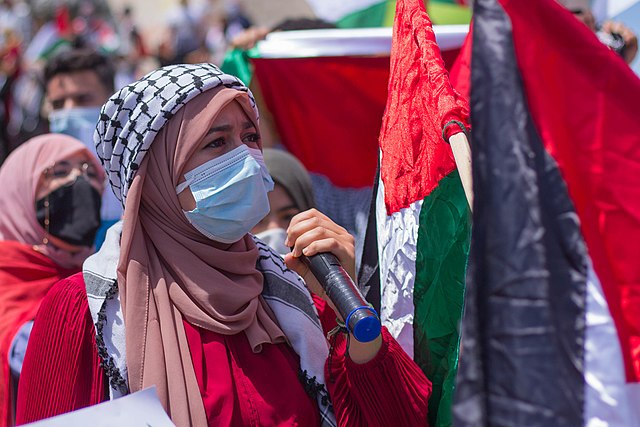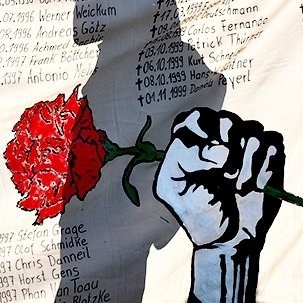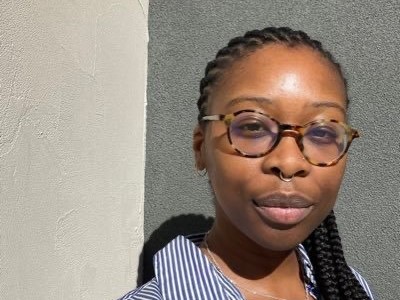On September 29th, an anthology edited by philosopher Susan Neiman and historian Michael Wildt, ‘Historiker Streiten: Violence and the Holocaust-The Debate‘ was published. It summarises the controversial roots of the Holocaust and how it differs-if it does- from other genocides. It addresses the pressing problem in Germany today: how can a culture of remembrance also include long-suppressed German colonial crimes? The book follows a symposium last October at the Einstein Forum in Potsdam.
This ‘Historian’s Debate’ is a crucial conversation on how Germany should confront its violent history beyond the Third Reich. But it was overshadowed by the exclusion of the Zimbabwaen-American academic Zoé Samudzi. She presented a paper at the symposium but was the only speaker not invited to contribute to Historiker Streiten. Samudzi’s contribution “A German History of Namibia or a Namibian History of Germany?” dealt with the historiography of genocide from the perspective of the perpetrators –and resolving this through the recognition of colonial suffering.
Samudzi addressed what seemed to be her calculated exclusion on Twitter. Susan Neiman responded that Samudzi presented an “interesting literary analysis,” but her lecture was only “tangentially related to the subject.” Wildt also responded that the editors’ decided to exclude her because the “volume was intended to focus on the historians’ dispute.”
Neiman further said that the “the book is not focused on the horrors of German colonialism or the Holocaust but on these questions: how can one compare different historical crimes? What are the historical, political and moral aspects involved?”
“We would have loved to include an African thinker dealing with these topics” Neiman continued, “and were in conversation with a number of writers who for different reasons were not able to participate.” Neiman also stated that while there were not any Black authors included, she and Wildt had firm commitments from three other women and people of colour. However, “In the end, they did not find time to write their contributions even though we extended the deadline for them by two months.”
No African scholar is included, but there are two PoC in the volume: Palestinian-German philosopher Sami Khatib and Indian historian Benjamin Zachariah.
Neiman: “The symposium was not meant to be a documentation, and most of the book’s authors were not present at the symposium. Zoe Samudzi gave a zoom-talk at the symposium concerning German colonial history in Namibia, which is available along with the other contributions. Most people who choose to listen will understand immediately that it was not the subject of the questions discussed in this volume.”
Other scholars regret Samudzi’s exclusion.
Australian scholar Dirk Moses ignited this historical controversy with his “The Catechism of the Germans” in May last year. His contribution is central to the anthology, but he did not know who the contributors were until shortly before publication.
“I can’t speak for other contributors, but I know some of us were dismayed by the omission of Dr. Samudzi, about which we learned on social media,” Moses said. “For a book on historians arguing about genocide in the German past there is, unfortunately, no contribution on the first German genocide and its relationship to the Holocaust.” “If the purpose of the book was to mirror the racism, sexism, and backward-facing features of the current German debate, it has, unfortunately and unintentionally succeeded brilliantly,” Moses concluded.
Similarly, anthology contributor Fabian Wolff was also disappointed. “I’ve learnt so much from Zoé Samudzi’s work, so I am personally sad that she wasn’t included not just because I’d have felt honoured to be in the same volume as her but because hers is the kind of scholarship and approach that should be centered in Germany”, Wolff said.
Samudzi said.“The editors’ belief that they’re committed to antiracism is disingenuous considering that the anthology was specifically about how we would now think about colonial crimes which was exactly what my presentation was about”. ““They are not interested in people writing about intergenerational memory for example… they’re only interested in this narrow and particular understanding of what citizenship is, what it means to be a German and what their political responsibility to the Holocaust is – even when they purport to be concerned or interested in the colonial question. The only interest in talking about the OvaHerero and Nama genocide is to relativize it to the Holocaust.”
Wolff added “German discourse culture is in dire need of pluralization, broadening and ultimately de-segregation. In valuable ways the anthology succeeds in doing that, so I’m glad it exists, and in other ways it’s maybe still part of the problem. It was never meant as the last word on anything, and this now just shows that it mustn’t be.”
Samudzi believes she is different from her German peers, because her work is in the US and her large social media following. “It is much harder to throw me under the bus in the same way Germany has sidelined Black German academics or other academics of colour” she said. “Oftentimes, you can’t have a career in German academia as a non-white person, unless you are a very particular kind of token or you tow a very particular political line.”
Many academics whom I spoke with agreed. Germany systematically excludes nonwhite academics, ignoring their scholarship, refuses to hire them for university positions, and sidelines them on conversations that they are experts in.
Anti-Palestinian racism
Anna-E. Younes is a German Palestinian critical race and postcolonial scholar who has faced exclusion from German academia for her outspoken work on race and how it relates to modern Antisemitism accusations. Since completing her Ph.D, Younes had issues with applications, so she stopped applying for jobs in Germany or engaging with academia. One academic employer told Younes that if they hired her they would “lose funding, be torn apart in the media for hiring me, and their institutions would be destroyed.”
Most recently ‘Recherche- und Informationsstelle Antisemitismus‘ (RIAS), prepared a secret file on Younes to get her disinvited from an event where she was speaking. During the event the organizers publicly grouped Younes with a far-right shooter who targeted a synagogue in Halle, based on her having signed a letter along with hundred other (international) academics that critiqued the anti-BDS resolution of the Bundestag. Having been excluded from the event, Younes was unable to defend herself.
Younes states that she gave up on German debates and focuses on an international audience predominantly now. “And in the moment you express that you feel sidelined and invisible you’re almost immediately shamed for it and told this is how it is – academia is difficult” she said. “Instead of looking at my case as an example of systemic exclusion of different opinions and scholarship, people turn around and think there has to be something wrong with the person.”
Younes believes that there is something antagonistic in German academia against vocal Palestinians or Palestinian rights supporters. Instead, Younes says that Palestinian identity in Germany has become conflated with Antisemitism and Islamist terrorism and is thus pushed out of any public debate.
Another instance is the story of an anthology, titled ‘Frenemies: Antisemitism, Racism and their Critics‘, edited by Meron Mendel, Saba Nur-Cheema and Sina Arnold. This was supposed to include Kerem Schamberger and Palestinian-German Ramsis Kilani. Their contribution was to be about excluding Palestinian perspectives from the current German Israel debate. But, after pressure from the other contributors, Schamberger and Kilani’s piece was omitted. Thus in an anthology dealing extensively with Israel-Palestine, there is not a single person with a Palestinian background involved.
“At some point all of these misinformation campaigns just cause us to become incredibly discouraged and simply broken because those having the power to frame public debates are not interested in what you actually said, wrote, or have to say – it remains within white hands predominantly” Younes said.
The pattern is not new. In 2017, Eleonora Roldán Mendívil, an academic teaching at the Free University of Berlin, suddenly found herself unemployed after she commented on a blogpost that Israel was “a colonial project” and an “apartheid state.” Pro-Israel groups in Germany targeted Roldán Mendívil, labeling her an antisemite. The university launched an investigation, headed by Wolfgang Benz, a nationally recognized researcher on antisemitism. Benz’s report exonerated her from all accusations of antisemitism, but the university refused to publish the findings, according to Roldán Mendívil. Instead, they wanted her to accept a non-disclosure agreement to forbid her from talking about the report publicly. She refused.
Germany’s commitment to fighting antisemitism quickly crosses into rejecting any criticism of the State of Israel with the endorsement of the International Holocaust Remembrance Alliance (IHRA) definition of antisemitism. This definition has been widely criticized by many activists and scholars as being so broad that it proscribes as antisemitic, criticisms of the Israeli state.
Nonetheless, The German Rectors’ Conference (HRK) — the association of public and government-recognized universities in Germany — publicly supported it, and adopted the IHRA’s working definition. Despite in 2019, having warned of the dangers to academic freedom in an age of “radically polarized opinions,” where the HRK stressed the “need to face up to attacks on academic freedom.”
Beyond pro-Palestinian academics
Anna Nguyen is a Vietnamese American academic whose research focuses on the literary studies of science and food literature. She pursues a Ph.D in Germany teaching as an adjunct. Nguyen left an academic program in Canada after facing professorial power, exclusion, and hostility from white academic supervisors, only to experience an identical situation in Germany. “[Canada] was my first taste of bullying and exclusion, and I am devastated that I now experience that here, even when I informed the program directors of my past experiences”, Nguyen said.
Filipina-German academic Karin Louise Hermes was forced to leave Berlin to return to her parents, unable to find a job. Living with her parents allowed her to focus on writing, yet her supervisor told her she was not ready to submit her dissertation after five years although making no comments on her chapter drafts. She believed she was a victim of “academic sabotage.”
“There was no real mechanism of complaint about a PhD supervisor, and… I was stuck with an individual who did not want to understand my work.. framed around decolonial thought. One German PhD supervisor was blocking international peer review feedback to my work. She even criticized my English skills. My supervisor never gave me constructive written feedback, but told me to wait for it, and then never communicated with me again for months until I needed a signature to submit, as if just waiting for me to give up” Hermes said.
When Nguyen similarly expressed concerns over her supervisor asking for a change, the responses stopped. “It’s been a year now and I still don’t understand what my status is at this institution- no one responds to my emails, and in fact the only emails I get are from the billing department” Nguyen said. “My international status is in jeopardy and this institution allowed me to fall through the cracks” she said.
Who remains?
Researchers working at the German Centre for Integration and Migration Research (DeZIM) conducted a pilot study on racism within the fields of migration, integration and racism research. In announcing their project, these researchers, specifically researchers of colour with intersectional experiences of exclusion, titled their project “Who remains?” They believe these institutions were not for them as they are expected to either fit in or leave.
“At the center of this study are the professional pathways of Black and PoC academics. From the outside it might seem as if we consisted of a homogeneous mass. However, the opposite is true. We are radically heterogeneous and we demand the possibility for the same” reads their project description.
Researcher Ali Konyali, at the DeZIM Institute, spoke to me. Although this research in its preliminary steps, what Konyali observed in qualitative interviews was similar experiences of exclusion, marginalization efforts and similar ways these individuals have dealt with it.
“Individual estrangement from institutions is systemic,” Konyali said. “What I noticed when I moved through academia is that certain things are not expected to be conducted by certain people. There is this objectivity paradigm that is imposed as an obstacle towards academics of color.”
Konyali exampled this objectivity paradigm in the belief academics of colour studying racism are unable to remain objective. “There is this expectation that people without racism experiences can keep a critical distance to their research, while academics who experience racism are unable to remain neutral,” Konyali said. “They are told that they are too involved with their own data and their own material and that they are emotionally too intertwined with their own knowledge production,” he said.
Konyali’s analysis is echoed by “Dear German Academia: What is Your Role in African Knowledge Production?” by Lynda Chinenye Iroulo and Juliana Tappe Ortiz. They argue that German research practices on Africa are entangled in epistemic injustice from colonial power structures.
Iroulo and Ortiz take a closer look at the hiring pattern and practices in African Studies in Germany, but the only way they could determine scholars’ backgrounds is to check whether they studied at African universities. The authors show that the most cited publications on Africa are written by non-Africans.
In Germany, universities and research institutes do not collect data on ethnicity and race when hiring academics. Many researchers, activists and academics believe this is a fault. “This is a very basic first step to prove that this problem exists, and unfortunately this is already a problem on its own,” Konyali said. “For people to believe that racism is a pervasive problem, you have to be open to conducting this very basic data collection.”
A 2018 report collected by the Royal Historical Society showed racial and ethnic inequality in history teaching in the UK. It claimed an underrepresentation of Black and Ethnic students and staff in university history programs led to substantial racial bias and discrimination. Among UK-national staff, 96.1% of university historians were White, a figure higher than in other subjects.
Historian Mirjam Brusius believes these numbers would be found amongst German historians and their diaspora communities if ethnicity-related data collection were used as a tool to fight discrimination.“We lack not just data, but also research and precise terminology to give a more accurate idea of the discrimination specific groups of Black Scholars and Scholars of Colour in German academia experience” she writes.“ The hashtag #BlackInTheIvory (a commentary on Black academics in higher education) may have gained little attention in Germany precisely because so few scholars there are Black or of Colour—but how would we be able to generate evidence?”
Many believe there seemed to be a shift after the murder of Black American, George Floyd, with the waves of protests that flooded Germany’s streets, but they believe conversations on race and inclusion are far behind in this country.
Ali Konyali points to the contradiction of Germany of suddenly wanting to be inclusive, ignited by an international case of racism- but largely silent on the one that took place at home. “Right before the murder of George Floyd was the mass shooting at Hanau where nine people were killed- yet the murder of Floyd did more to advance talking about prejudice and exclusion which shows that Germany externalizes racism” Konyali said.
“While there were people showing online solidarity, it was rare that Germany really confronted its own history partaking in colonialism and the effects that are still there – I haven’t witnessed real outrage over this in Germany yet” German-Ghanian academic, Anna Hankings-Evans said.
In an exam during her legal traineeship, Hankings-Evans had to take the position of defending a Nazi and believed there were not any options for her to opt out. “There are not enough safeguards for me to refuse to take part in such an exam as a Black woman” she said.
“Last year, when ‘Black Lives Matter statements’ filled websites of predominantly white history departments in the US and the UK, it did not escape colleagues abroad that historians in Germany chose not to speak out”, Mirjam Brusius said.
“Change — I think – can only come in Germany when we have accountability towards these institutions and structures, and I think that comes with really interrogating why things are taught the way they are”, Hankings-Evans said.
“I believe some white academics and even those involved in the Historian’s Debate, need to understand that Germany’s remembrance culture poses existential questions that are directly connected to real-life experiences today. What forms Germany’s memory is connected to the rise of the fascism in the present” Zoé Samudzi said.
“If our colleagues are the Nachwuchs of the Nazis”, Wendy Shaw, an internationally renowned expert in Islamic Art argued, it was not because of their “birth as Germans, but because many had not rethought the nature of authority and exclusion and replaced the white-patriarchal hierarchy at the heart of universities with a working system of diversity and inclusion”.
Conclusion
“At the current moment in Germany”, Samudzi continued, “there is no real interest in tackling anti-Blackness, or decoloniality as a whole.”



